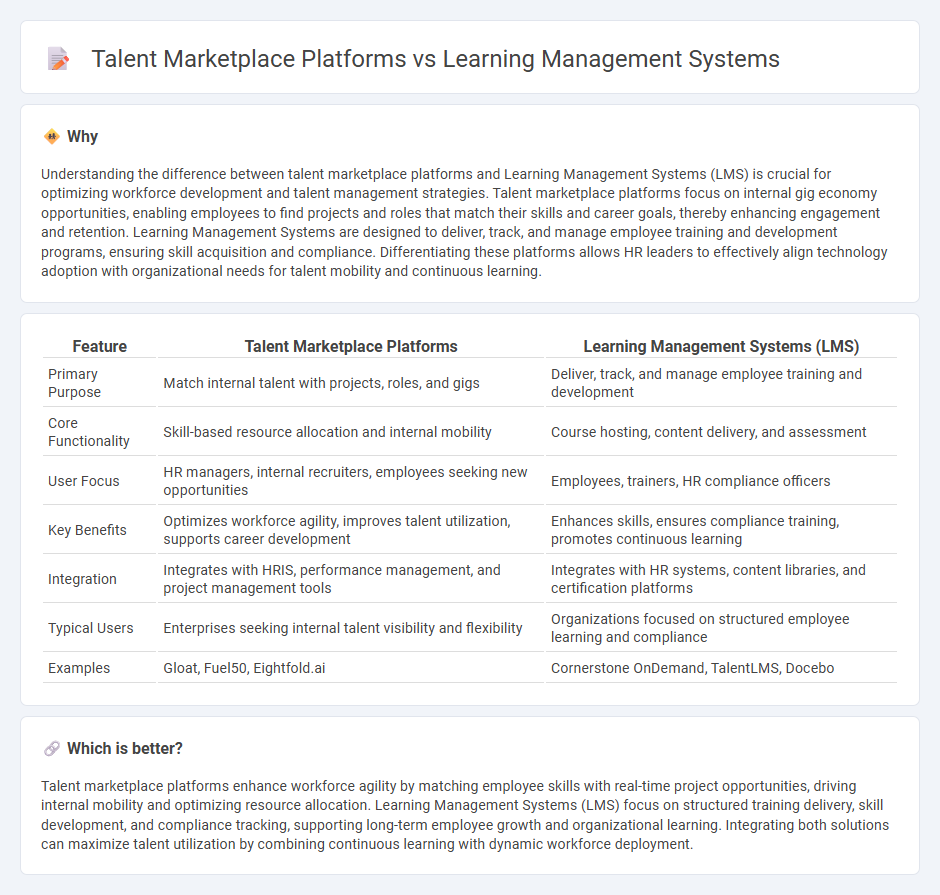
Talent marketplace platforms streamline internal mobility by connecting employees with project opportunities based on skills and career goals, enhancing workforce agility and retention. Learning Management Systems (LMS) focus on structured training and development, delivering courses and tracking progress to upskill the workforce effectively. Explore how integrating talent marketplaces with LMS can revolutionize employee development and engagement.
Why it is important
Understanding the difference between talent marketplace platforms and Learning Management Systems (LMS) is crucial for optimizing workforce development and talent management strategies. Talent marketplace platforms focus on internal gig economy opportunities, enabling employees to find projects and roles that match their skills and career goals, thereby enhancing engagement and retention. Learning Management Systems are designed to deliver, track, and manage employee training and development programs, ensuring skill acquisition and compliance. Differentiating these platforms allows HR leaders to effectively align technology adoption with organizational needs for talent mobility and continuous learning.
Comparison Table
| Feature | Talent Marketplace Platforms | Learning Management Systems (LMS) |
|---|---|---|
| Primary Purpose | Match internal talent with projects, roles, and gigs | Deliver, track, and manage employee training and development |
| Core Functionality | Skill-based resource allocation and internal mobility | Course hosting, content delivery, and assessment |
| User Focus | HR managers, internal recruiters, employees seeking new opportunities | Employees, trainers, HR compliance officers |
| Key Benefits | Optimizes workforce agility, improves talent utilization, supports career development | Enhances skills, ensures compliance training, promotes continuous learning |
| Integration | Integrates with HRIS, performance management, and project management tools | Integrates with HR systems, content libraries, and certification platforms |
| Typical Users | Enterprises seeking internal talent visibility and flexibility | Organizations focused on structured employee learning and compliance |
| Examples | Gloat, Fuel50, Eightfold.ai | Cornerstone OnDemand, TalentLMS, Docebo |
Which is better?
Talent marketplace platforms enhance workforce agility by matching employee skills with real-time project opportunities, driving internal mobility and optimizing resource allocation. Learning Management Systems (LMS) focus on structured training delivery, skill development, and compliance tracking, supporting long-term employee growth and organizational learning. Integrating both solutions can maximize talent utilization by combining continuous learning with dynamic workforce deployment.
Connection
Talent marketplace platforms and Learning Management Systems (LMS) are interconnected through their shared goal of workforce development and skill optimization. Talent marketplaces utilize LMS data to identify employees' competencies and learning progress, matching individuals to relevant job opportunities or projects. This integration enhances talent mobility within organizations and supports continuous professional growth by aligning skill development with organizational needs.
Key Terms
Training Delivery
Learning Management Systems (LMS) provide structured training delivery through course management, tracking, and automated assessments, ensuring consistent learner progress in formal educational settings. Talent marketplace platforms emphasize personalized skill development by connecting employees with on-demand learning opportunities and expert mentors, fostering agile workforce growth. Explore the key differences and benefits to optimize your organization's training delivery strategy.
Skills Matching
Learning management systems (LMS) specialize in structured training delivery and progress tracking to enhance employee skill development, while talent marketplace platforms excel in real-time skills matching and internal talent mobility by leveraging AI-driven algorithms. Talent marketplaces aggregate comprehensive skill profiles and project opportunities, enabling organizations to optimize workforce agility and project staffing efficiently. Discover how integrating both systems transforms skill utilization and drives organizational growth.
Career Pathing
Learning Management Systems (LMS) provide structured educational content and track skill development, whereas talent marketplace platforms facilitate dynamic talent matching and internal mobility for career pathing. LMS are ideal for standardized training programs, while talent marketplaces offer personalized career growth opportunities by aligning employee skills with organizational needs and job openings. Explore how integrating both systems can enhance career pathing strategies and foster continuous professional development.
Source and External Links
What is a Learning Management System (LMS)? - A Learning Management System is a software application used to plan, implement, and assess learning processes, providing tools for content creation, student tracking, and performance assessment.
Learning Management System - A Learning Management System is a software application for the administration, documentation, tracking, reporting, automation, and delivery of educational courses or training programs.
Learning Management System, LMS Software - This webpage describes Canvas LMS as a central hub for managing online, hybrid, and in-person classroom materials and interactions, facilitating student-educator communications and virtual meetings.
 dowidth.com
dowidth.com